Understand the World
Israeli-Hamas War Enters Second Phase
Published
8 months agoon
By
lily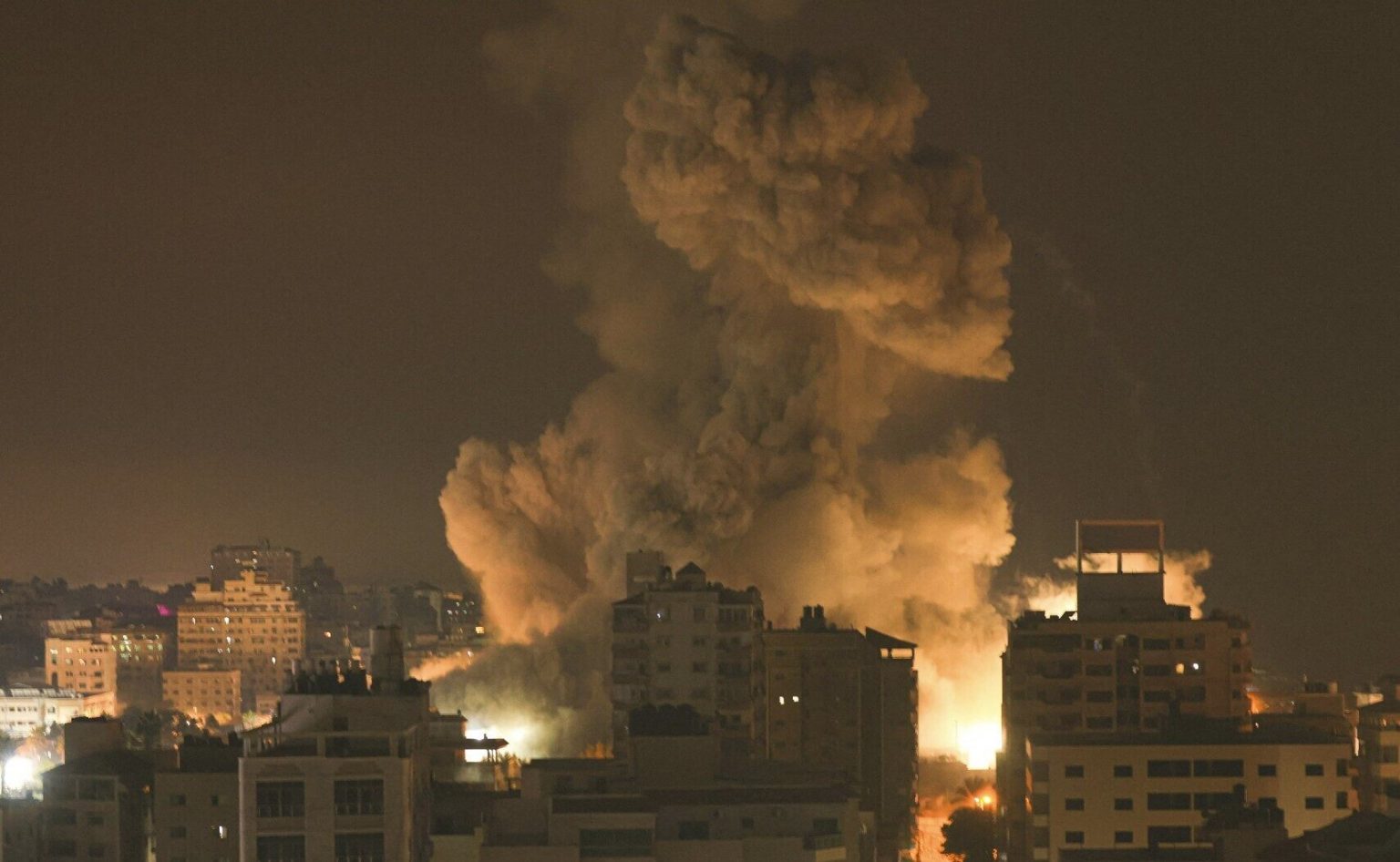
Since the Hamas raid on October 7, 1,400 people have been killed and 229 kidnapped in Israel. Israel has been bombing Gaza in retaliation.
According to the Ministry of Health in Hamas-controlled Gaza, more than 8,000 people have been killed since Israel’s retaliatory bombing. What is the second phase of the war? According to Israeli Defense Minister Yoav Galant, the war will be divided into three phases: the first phase of the operation will be aimed at destroying Hamas infrastructure; the second phase will see Israeli forces “eliminate pockets of resistance”; and, after the third phase, Israel will no longer be responsible for Gaza’s operations and will achieve a new level of security for Israeli citizens. A few days ago, Israeli Prime Minister Netanyahu said that Israel’s ground operation in Gaza marked the “second phase” of the war with Hamas and that it would be a “difficult and long battle.
Israeli-Hamas war escalates
As the war enters its fourth week, the Israeli army’s ground offensive, backed by tanks, is moving deeper into Gaza.Earlier this week, Palestinians in northern Gaza said Israel was carrying out heavy air and artillery attacks on Gaza. The Israeli military confirmed that it had struck military infrastructure in Syria in response to Syrian shelling of Israeli territory earlier on Sunday. The Israeli military’s bombing and ground campaign against Gaza has been the most intensive to date since the conflict began, bringing the violence and suffering in this terrible crisis to a new high. There have also been a series of attacks on U.S. troops in Iraq and Syria, and a growing exchange of fire between Hezbollah and Israeli forces on the Lebanese border. There are growing concerns about the regional impact of the Israeli-Hamas war.
A few days ago, Hamas Gaza leader Sinwar made his first statement on the organization’s official website, saying that he was ready to immediately reach an exchange of communications agreement and would be willing to release all hostages held in Gaza in exchange for Israel’s release of all Hamas prisoners in its jails. In response, Netanyahu said that Israel’s wartime cabinet had discussed a hostage-for-prisoner swap, but declined to give specific details. The hostage crisis has put new pressure on Israel’s leadership, with relatives and others calling for the safe release of hostages. But Netanyahu said the battle was “a 3,000-year battle for Jewish survival” that Israel must win. Destroying Hamas is his primary goal, securing the release of the hostages is secondary. This was a great disappointment to anyone who had hoped to hear the news that Israel was suspending its attack on Gaza to secure the release of the hostages.
Leaflets are once again flying over Gaza City, warning residents that the area is now a “war zone” and that they must go to the south. But the civilian population of Gaza remains cut off from the outside world, as Israeli attacks on telecommunication facilities and the subsequent shutdown of the Internet have left Gazans with no way of knowing what is going on, and all contact with the outside world has been severed. Outraged by Turkish President Recep Tayyip Erdogan’s accusations of war crimes, Netanyahu withdrew his country’s diplomats and called the Israeli Defense Forces (IDF) a “moral army,” arguing that its military operations in Gaza were aimed at destroying Hamas and its infrastructure so that it could no longer launch attacks. At this point, does anyone really feel the endless pain and misery of the civilian population of Gaza?

Is it really an Israeli/Hamas war?
As it stands now, the Israeli army has entered the Gaza Strip, which Israel considers to be under the control of the Hamas organization. However, nominally, Gaza is the land of the State of Palestine, and Hamas is only a political party elected in Gaza in the 2006 election, not the government of the State of Palestine. Many Western countries regard Hamas as a terrorist organization, and Israel’s current attempt to eliminate Hamas, which is carrying out terrorist attacks against Israel, by killing a large number of unarmed Palestinians who are not attacking Israel, is clearly an atrocity that violates the basic laws of international war. The United States, Britain and Australia have not yet condemned Israel for waging war by killing innocent civilians even though it may have legitimate reasons to eliminate the Hamas organization. According to the Australian Foreign Minister, Penny Wong, it is hoped that Israel would listen to its supporters’ “humane words to the Palestinian people”. These remarks in defense of Israel’s attack and the death of a large number of Palestinians have aroused national discontent and protests in the United States, the United Kingdom and Australia.
Israel blames the Hamas organization for using the Palestinians as human shields, but fails to acknowledge its responsibility for the humanitarian disaster of the blockade of Gaza, which has resulted in the deaths of a large number of Palestinians by cutting off water, electricity, food and supplies, in clear violation of the United Nations human rights covenants. Both Israel and Palestine are signatories to a number of United Nations human rights conventions and are obliged to abide by them. On the contrary, the Hamas organization is not a state and is not governed by the treaties. The fact that the U.S., U.K., and Australia are not talking about this issue shows that politicians do not have moral courage, and that they do not care about the means to achieve their goals.
Co-operation or each with its own agenda
On October 27, the United Nations General Assembly overwhelmingly called for an immediate humanitarian ceasefire between Israel and Hamas, leading to a cessation of hostilities and more aid to Gaza. This was the first UN resolution formally adopted since the latest round of conflict between Israel and Hamas on October 7, but Israel angrily rejected the resolution. Since the conflict, Western countries have generally supported what they say is Israel’s right to self-defense, but there has been growing international concern about the casualties caused by the air strikes and increasing calls for a pause in the fighting in order to provide aid to the civilian population of Gaza. By this time, the fighting in Gaza had begun to spill over into the West Bank of the Jordan River, where tensions were exacerbating the challenges posed by the war in Gaza, and there was still no solution in sight to the Israeli-Hararem conflict. The response of the international community was particularly important.
While the U.S. recognizes Israel’s right and indeed its obligation to defend itself from terrorists, it has also continued to urge Israel to use all possible means to distinguish between Palestinian civilians and Hamas militants as it expands its military ground operations in Gaza. Norwegian Prime Minister Jonas Gahr Støle, for his part, said that Israel’s response to the Hamas attacks went beyond the rules of international law on proportionality and expressed concern about the expansion of the war in the region. The United Arab Emirates, the first Gulf state to normalize relations with Israel by 2020, also expressed deep concern about the escalation of the Israeli military and the intensification of the humanitarian crisis, which could lead to more civilian deaths.”
Of course, there are also powers that smell a rare opportunity in this Israeli-Palestinian war – Moscow’s elevation of its role as a global power mediator and its challenge to the West’s efforts to isolate it over Ukraine. Russia has been cautiously critical of both sides, hoping that Israel’s war with Hamas will divert attention from the war in Ukraine and weaken Western support for Kiev. If Russia wants to be part of a multilateral alliance that provides security, it is important to maintain a balanced, nuanced approach that does not alienate either side. However, Moscow also runs the risk of jeopardizing Russia’s relationship with Israel. So far, Israel has refused to supply Ukraine with weapons.
China is also stepping up its efforts to position itself as a neutral mediator for peace in the Middle East as the Israeli-Hararean conflict intensifies, leading to a larger war. The most senior Chinese government diplomat called his Israeli and Palestinian counterparts last Monday to urge restraint. A Chinese envoy is traveling in the Middle East, promising to help avoid a wider war. But as China seeks to cool the conflict through diplomacy, anti-Semitic and anti-Israeli sentiment is surging on the Internet and in official media in China, undermining the Chinese government’s efforts to signal neutrality. News of the stabbing of a family member of an Israeli diplomat in Beijing has also been restricted by the government on social media. While China and Israel maintain some economic ties, Israel’s close alliance with the U.S. remains an obstacle to closer Sino-Israeli relations, and it is an indisputable fact that China’s ties with Arab countries have been strengthening in recent years as it seeks to deepen its foothold in the Middle East.
How to End the Eternal Dilemma?
Netanyahu has made clear Israel’s position on the ceasefire issue, calling it a “time of war” and ruling out calls for a ceasefire in Gaza. He has even gone so far as to say that, just as the US would not have agreed to a ceasefire after the Pearl Harbor attack or the 9/11 terrorist attacks, Israel would not have agreed to a cessation of hostilities with Hamas after the October 7 terrorist attacks, arguing that to call for a ceasefire would be to call on Israel to surrender to Hamas, to surrender to terrorism, to surrender to the terrorists, to surrender to the terrorists, to surrender to the terrorists. Israel will not agree to cease hostilities with Hamas
after the October 7 terrorist attacks. In the aftermath of the October 7 terrorist incident, Israeli officials have repeatedly stated that they intend to uproot Hamas from the Gaza Strip, both militarily and politically. But it is unclear how this unprecedented ambition will be realized beyond the use of relentless, overwhelming military force. The only fact in the world is that the casualties on both sides have been horrific and dehumanizing on an unprecedented scale.
Organizations such as Save the Children and UNICEF are reviewing data from the Ministry of Health in Hamas-controlled Gaza, which puts the number of Palestinian child deaths at nearly 3,000, but the actual number is likely to be much higher, as hundreds more are unaccounted for and may be trapped in the rubble. As the war between Israel and Hamas continues to escalate, leaders around the globe will need to ponder this question in the coming days: is killing nearly 1,000 children a week self-defense? It’s a tough question that could pit Israel and its staunch supporters against the rest of the world. Albanese will be asked this question at some point. Six of Australia’s seven living former prime ministers have now issued a rare joint letter condemning Hamas, supporting Israel and calling for unity with Australian Jewry.
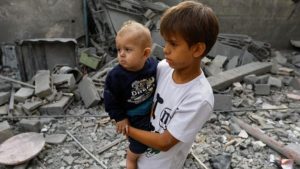
The six prime ministers’ letter, while concerned about the harm done to the Palestinians, did not hold Israel responsible for them, calling for peace and reminding Australians not to make enemies of each other through conflict overseas. Former Prime Minister Keating, who did not sign the statement, refused to sign the statement, which was presented to him by a Jewish lobbyist group, because he wanted to avoid being influenced by them to lose his neutrality. However, it has also been pointed out that the statement was written by former Prime Minister David Campbell, and it is believed that the incident will generate more discussion in Australia.
Regardless of how this war, now in its fourth week, will end, the book has turned a new page. In the end, Israel has not been able to escape the conflict that has haunted it since the establishment of its modern state in 1948: two groups – the Jews and the Palestinians – claim the same narrow strip of land between the Mediterranean Sea and the Jordan River. Its wealth, thriving startup culture, and growing acceptance in the Middle East will not always mask Israel’s fundamental instability. Particularly as a result of this blow, Israel is also facing a profound social and political upheaval. The question of when the fires of hatred between Israelis and Palestinians will be quelled and when the civilian catastrophe will end is far from being answered.
Article/Editorial
Photo/Internet
You may like
Understand the World
The Internet Micro-Short Drama is Hard to Say
Published
3 months agoon
May 6, 2024By
lily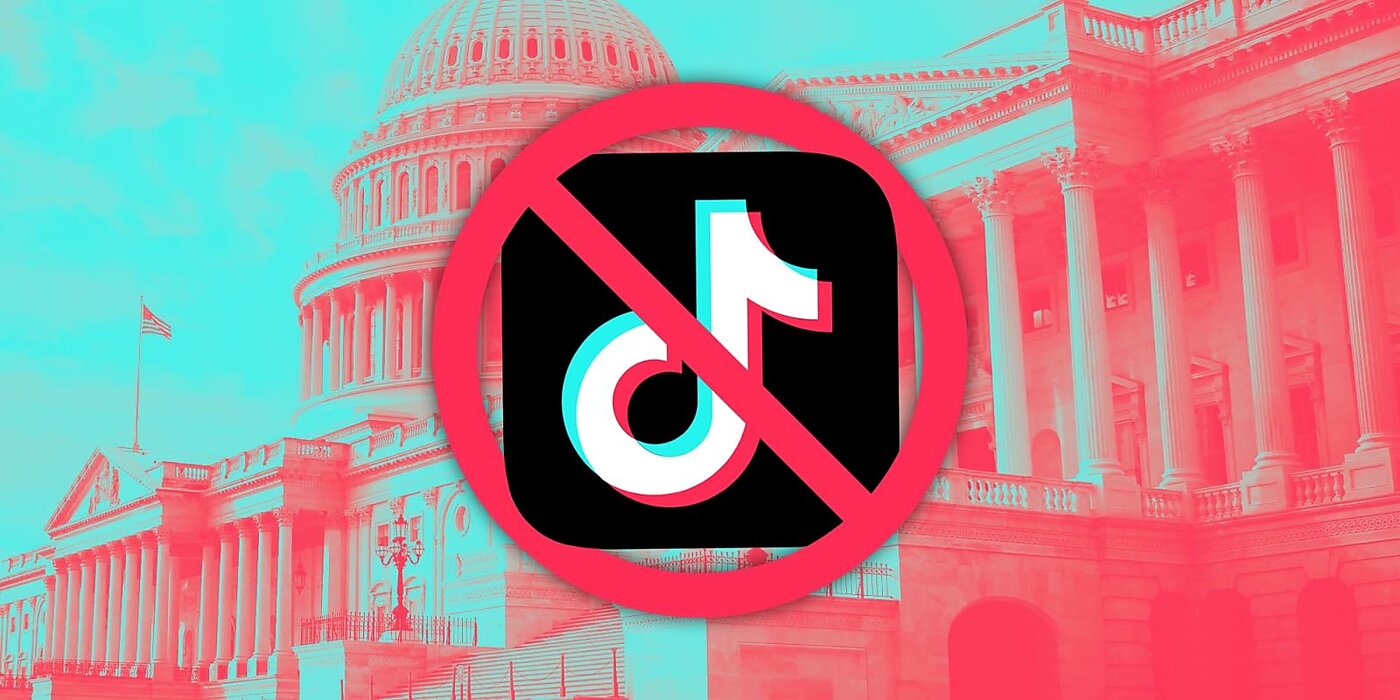
On Saturday, the U.S. House of Representatives passed a bill that would give TikTok’s Chinese owner, ByteDance, a stark choice-sell its U.S. business or be banned. The bill was introduced in the Senate on Tuesday, where it passed by a wide margin of 79 votes to 18, and was then signed into law by President Joe Biden. The move has sparked concern among the social media app’s 170 million users in the U.S., knowing that about 170 million Americans spend at least an hour a day swiping on TikTok, and more than 40 percent of U.S. users even say it’s their regular news source. In recent years, TikTok has been the subject of numerous conversations, even in the context of national security. Undeniably, TikTok is an extremely important source of information and entertainment for today’s young generation, and whether the values conveyed by its content will affect people’s daily lives or even their judgment on important issues should not be overlooked. In this regard, the popularity of micro-dramas on the Internet is playing an important role.
TikTok is a video platform that provides one- or two-minute short videos to users, mostly young people. The content of these videos is wide-ranging, including jokes, commercials, personal sharing, anything from news to irresistible sketches. What is most concerning about this software is that it collects video and other data from users, analyzes it and sends it back to its headquarters in China, where it suggests new videos to users, making it a tool that collects countless amounts of user privacy to study, analyze, and potentially manipulate their behavior. This is precisely why the US government is now determined to take control of TikTok away from its unregulated parent company, ByteDance, in China.
In the past, criticism of TikTok has centered on the privacy and national security implications of the data it collects, but the popularity of TikTok in the West has also led to a massive export of webisodes from China to the West. Unlike traditional video products, which are regulated by the government on the basis of content, any kind of content can be included in a web series. The popularity of TikTok has also affected many people in Western societies. Today, we will look at TikTok’s manipulation of people’s behavior from a different perspective.
The “Myth of Wealth” Micro-series
Movie dramas are not new, they have been affecting everyone since the beginning of television, but they have always been regulated by society as an entertainment experience. Most of the TV dramas are 25 to 50 minutes in length, and are therefore mostly watched on TV or computer platforms during leisure time. However, webisodes, which are now popular on the internet, have entered every minute or every second of people’s lives through smartphones, and have a greater impact on people at any time.
Webisodes are a type of web series that started in China and is now popular in countries all over the world due to TikTok. Each episode of webisodes is about 2 minutes long, with a tight and continuous plot. As a video format between movies and novels, short dramas have unique characteristics in content creation. In recent years, short dramas have accounted for half of all short video content creation, and China has become the global kingdom of short drama production, dominating global production. According to industry statistics, over the past three years, the annual production of short dramas has surged from a few hundred to tens of thousands. The pursuit of low-cost and fast-paced short dramas corresponds to the long production cycle of long dramas. With the rising popularity of short dramas, the industry has seen the emergence of the phrase “7 days to finish shooting, 8 days to earn more than RMB 100 million, 10 days to get rich”, which was once even considered a “myth of wealth creation”. Data shows that in 2023, the number of users actively searching for micro-dramas on Shake Tone (the mainland China version of TikTok) increased twofold, and the number of micro-dramas with a broadcast volume of over 100 million reached 500, of which 12 had a broadcast volume of over 1 billion, with the number of micro-dramas broadcasted on a daily basis doubling.
The audience of micro-drama is often those who cannot be served by traditional movie and TV products. In other words, most of the audience of micro-dramas do not watch movies at all. Combined with China’s current Internet population of nearly 1.1 billion, it can be deduced that 600-700 million people in China have only a junior high school education, and this group of people is the basic market for micro-dramas. As a new growth point in the Internet economy, micro-drama has attracted a large amount of capital and production teams to enter the market. Although the ceiling of the short drama industry is only a few tens to hundreds of billions of dollars, it does not affect the enthusiasm of everyone to come in and make a fortune. However, it is obvious that this kind of crazy scene can not be sustained, or in other words, it can not be allowed to grow wildly.
Last year, the market size of micro-episodes in China reached 37.39 billion yuan (RMB), and it is estimated that by 2027, the market size will exceed 100 billion yuan (RMB). From the audience’s point of view, in addition to young people in small towns in third- and fourth-tier cities, more and more people in first- and second-tier cities who are living at home or returning to their hometowns are also holding their cell phones and brushing up on micro-dramas, and even paying for them. The pace is fast enough and the plot is cool enough to make the micro short drama explode and attract money last year. New opportunities have attracted long and short video platforms to increase their stakes, and big star IPs have entered the market, so the future of the micro drama industry is full of opportunities and hidden challenges. Especially in the generative artificial intelligence model and other new quality of productivity, the network micro short drama creation and production will meet the new repeated computing upgrade, and thus really towards the diversification, boutique development road.
Control the Market or Control the Speech
The aesthetics and style of many short micro-dramas still cannot escape the vulgar label – the underlying logic of the micro-drama “focusing on conflict, light on drama” determines that it is a channel for emotional release, and that it is a content product with a strong emotional color. The quality is not guaranteed. Young people who spend their days on Jitterbug have even developed an “addiction” to it. After all, teenagers are a group of people with varying degrees of self-control, who are easily influenced by their surroundings, and who pursue and follow trends. The latest trends on short videos are shared by a large number of young people. Coupled with peer pressure, it’s no surprise that the younger generation is addicted to them. According to the Pew Research Center, 60% of the 170 million Americans who use TikTok in the U.S. are also teenagers. It’s a global phenomenon. So what messages and values are conveyed in the content of micro-series is crucial for teens whose brains are not yet fully developed.
The State Administration of Radio, Film and Television (SARFT) of China has issued a new regulation on the filing of micro-dramas, and has been strictly reviewing and managing online micro-dramas since June 1: all micro-dramas broadcast, streamed, and pushed on the Internet must have a “Web Drama Distribution Permit” or complete the corresponding online reporting and registration process, and micro-dramas that have not been audited and filed are not permitted to be disseminated on the Internet. Before the implementation of the new regulations, Jitterbug, Shutterbug and other audiovisual platforms have begun self-censorship, and some of the micro-dramas have been accused of containing content that “promotes unhealthy and non-mainstream views on family, marriage and love, and deliberately amplifies and renders conflicts between couples and mothers-in-law and daughters-in-law, etc.,” which was taken down by Jitterbug platforms. ShakeYin has also issued a special governance announcement to encourage and promote quality micro-dramas, and to continue its governance of micro-dramas that contain illegal content such as those with undesirable values, those that violate public order and morality, and those that are vulgar and “rubbing the wrong side of the tracks”.
Since China has not yet established a classification system for movie and TV works, all that has been done is administrative intervention by government departments and self-examination and self-correction by online platforms. Nowadays, more and more short-form video publishers, in order to increase the number of hits, often expose social injustice, embarrassing the government, which can only find excuses to block them. In addition, the media is a propaganda tool in China, and has a role in guiding public opinion. If more and more micro-short videos hit the pain points of the society and play a little bit of policy, then a competitive trend will be formed in the circle. This is probably something that the press authority or the public opinion control department does not want to see. Therefore, the Chinese government is regulating and controlling them, restricting their development in various ways; but naturally, this kind of governance is not free from the suspicion of controlling freedom of speech and clamping down on public opinion.

Impact on the Western World
As this new form of content consumption born in China has matured, micro-dramas are inevitably moving out of the country and into overseas markets. In the U.S., the biggest player in this new genre is ReelShort, owned by northern California-based Crazy Maple Studio and backed by Chinese digital publisher Chinese Online Group. The mobile app, which offers users episodes of up to a few minutes in length on a flip-screen screen, hopes to bring the successful model it has built in China to the U.S. by attracting millions of Americans to its short-form content. ReelShort offers more than a dozen one-minute episodes for free on a variety of platforms, including YouTube and TikTok. But after the first few episodes, they have to pay a fee or watch a commercial to see what happens afterward.
Now the ReelShort platform is a huge hit with Chinese American women – 70% of its users are women, and nearly half are over the age of 45. It seems that human nature is common to all countries, and they can’t get enough of all kinds of short videos on the subject of hegemony. What’s more, human nature has been highly stable throughout the evolution of mankind: greedy for beauty, wealth and food, suspicious and irritable, with a lingering sense of vanity and arrogant superiority. …… These weaknesses of human nature have eventually become the promised land of milk and honey flowing outward in today’s highly developed commercial society! –Numerous trillion-dollar businesses are based on this. Micro-drama is just a new business based on this.
Although the regulation of micro short dramas in China continues to increase, and began to increase the audit of short dramas, but these short videos are still in the overseas wind: from the overbearing president, to the werewolf and vampire love, and then revenge sadistic love …… These short dramas, which had been in the domestic screen repeatedly, are now also in the overseas set off a new trend. A large number of earthy short dramas have flooded into Europe and the United States, the Middle East and Southeast Asian markets, not only overseas Chinese head, but also local natives are willing to pay, and even some domestic viewers to learn English. Obviously, compared to the increasingly competitive domestic market, the overseas market is still a blue ocean that needs to be explored and has a lot of potential.
Western countries rarely take the initiative to regulate media content because of their respect for individual freedom, and when there is a conflict between ideology and mainstream social values, they usually categorize the content and restrict the audience to protect young people who are not mature enough to understand. This is also a problem that cannot be ignored. Especially considering that the cost of legislation in Europe and the United States is relatively high, the regulation of this area is relatively lax, which has left time for many players to set up their business. Of course, if Chinese manufacturers want to establish a firm foothold in the European and American markets through micro-drama, they still face big challenges, the first and foremost of which is the communication of ideas. Although the promotion of short dramas has been completed in some areas, it will take time for other regions with different cultures and preferences to accept the form of short dramas. The passage of the TikTok bill in the U.S. may add a touch of uncertainty to the development of micro-episodes in overseas markets.
Article/Editorial Department (Sameway Magazine)
Photo/Internet
Understand the World
From the Mystery of “Sheikh of Dubai
Published
3 months agoon
May 6, 2024By
lily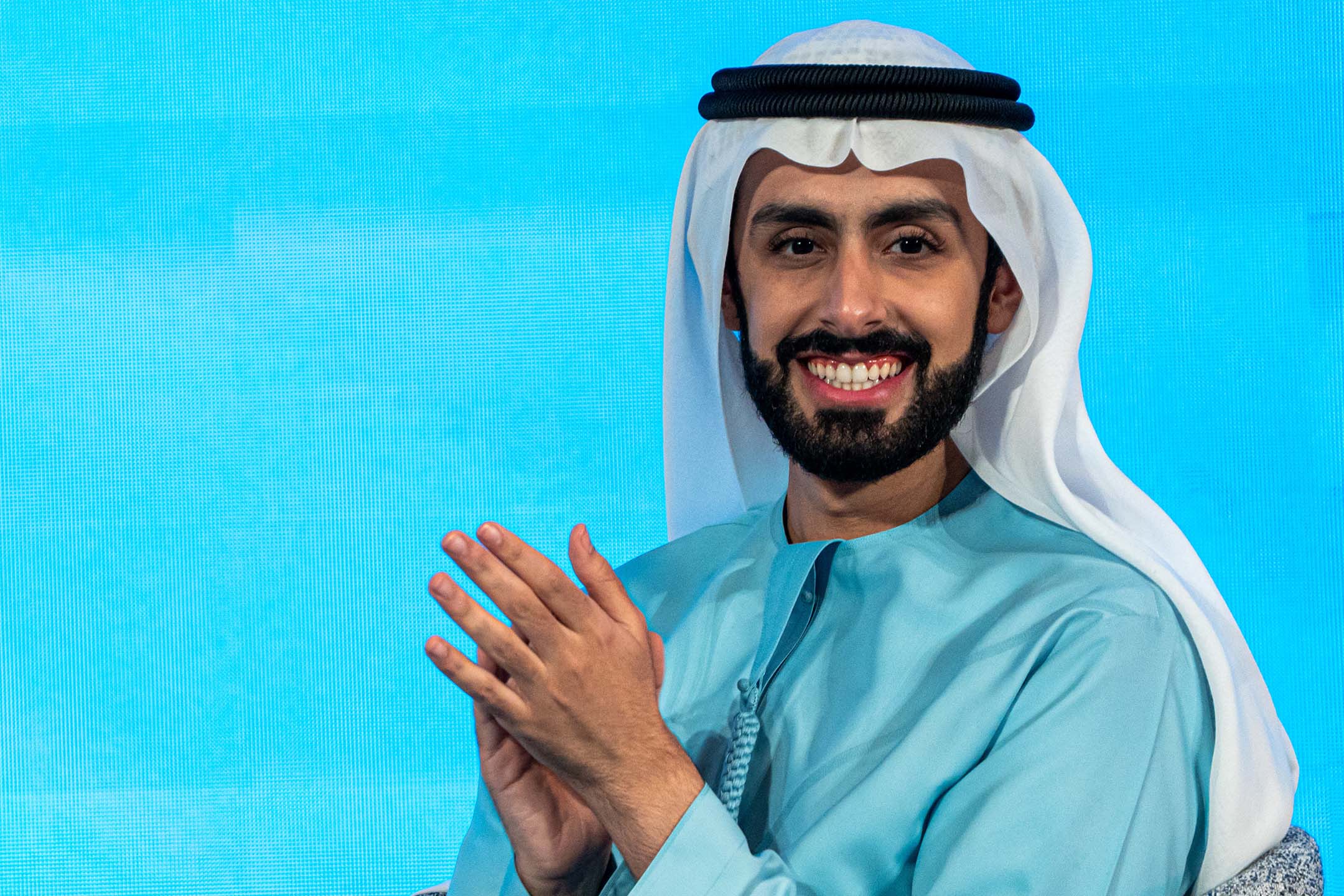
Hong Kong has been slipped into the limelight again. A few months ago it was Lionel Messi, now it’s the so-called “Sheikh of Dubai”. Some time ago, a noble “Sheikh of Dubai” named His Highness Sheikh Ali Al Maktoum visited Hong Kong, and right away he made a big move – he wanted to invest 500 million US dollars in Hong Kong to set up a family office! After his visit to Hong Kong last December, he decided to set up a family office, his first overseas presence. If it goes well, it will be the first overseas family office of the Dubai royal family. But just when everyone thought that the “Sheikh of Dubai” was coming to Hong Kong with a bag full of money, things suddenly took a turn for the worse.
“I’ll be back in May!”
Originally, the Sheikh said he had invested US$500 million in the project and was received by the Hong Kong government with high standards, and the Chief Executive, Mr. John Lee Ka Chiu, also met with him in person. However, before the scheduled launching ceremony of the family office, the Sheikh suddenly had to leave on important business, and he even sent a message through the air, “I’ll be back in May! The last person to say such a thing was Jia Yueting, who is building a car in the United States and will always claim return home next week. This sudden change has made people suspicious of his real identity and intentions. With the depth of the investigation, the media also gradually unveiled the real veil of Ali.
Through facial recognition technology, it was determined that Sheikh Ali bears a 100% resemblance to a singer named Alira. According to Alira’s online video interview, he said that his parents are pure Dubain, no Filipino blood, because he likes the kindness and enthusiasm of Filipinos, so he sings Filipino songs. From the tone of his voice and his English accent, he seems to be the same person as Sheikh Ali. Currently, Alira’s official website, Instagram, Facebook, YouTube, and TikTok homepage are all inaccessible.
In the Middle East, there are many Sheikhs, while Ali was not known in Hong Kong before. Some Hong Kong media even found that almost no one in the political and business circles in Dubai knows Sheikh Ali. The Sheikh’s family office website is less than a year old, and the address is in the middle class area of Dubai, far from the business center, and the address in Hong Kong is just a signboard instead of the name of the Sheikh’s family office. The Director of International Relations of the Sheikh’s Family Office is called William Tien, whose doctoral title comes from the “Humanitarian technologies innovation and deployment Honorary Doctor” awarded by Horizons University in France. After checking, this Horizons University was once exposed by the media as a pheasant university.
When things got to this point, a reporter asked the UAE Consulate General in Hong Kong, and the reply was: “It is confirmed that Sheikh Ali is from the ‘ruling family’ and can be addressed as a ‘sheikh’”, and is a distant relative of the current UAE Vice President, Muhammad Al-Maktoum. Hong Kong government people also responded to the news, said the Sheikh’s title is written on the passport, so the identity is real, I hope people do not guess, but also do not be nervous, after all, Hong Kong has not suffered any loss. In that case, he is not a fake Sheikh, but he is just not that close to reality. Has Hong Kong been “tricked” or not? Will the “Sheikh of Dubai” come back in May? It’s hard to tell if it’s true or not, so we can only wait and see what happens.
However, in handling this incident, Hong Kong government officials seem to be inexperienced in the process of “scaffolding” (i.e., using public relations tactics to create visibility and recognition in order to gain higher public recognition), and are unable to distinguish the real from the fake and differentiate the powerful innovators from those who are just bubbles but not powerful bigwigs. Without verifying the backgrounds of the people concerned, CE John Lee has been utilized as a cheerleader to promote his client, which can be regarded as a display of incompetence.
The Mysteries of Truth and Falsehood
A lot of people in Dubai are Sheikhs, just as Liu Bei said he was the descendant of King Jing of Zhongshan in the period of Three Kingdoms, but a lot of people have some Han lineage, Liu Bei’s thin lineage did not bring much dividend; it was a bit useful after he went to Jingzhou. And it is in this kind of gray area, true or false, real or false, so that the outside world can not see clearly, so that there is an opportunity to create momentum, take advantage of the situation, for their own profit. It must be said that the “Sheikh of Dubai” incident nowadays inevitably reminds us of another past incident – the media-hyped “His Holiness the White Horse Osei”, Wu Dayong, nearly a decade ago.

In 2015, “His Holiness Baima Osei” Wu Dayong held a grand sitting ceremony for actor Zhang Tielin in Hong Kong, and gave Zhang Tielin the Dharma name, Dharma vestments, Dharma equipment and other items. In his personal website and external propaganda, Baima Osei even claimed that Naomi Xinxiong Rinpoche and Moza Rinpoche of the Kadu Monastery in Sichuan had certified him as a living Buddha. However, the occasion, the program, and even the robes he wore were all said to be not in line with Tibetan Buddhist religious rituals.
The microblogging credentials of Wu Dayong were even more bluffing – “Chairman of the World Trade Organization Foundation”. This was the home base of His Holiness Baima Osei, and all his activities were organized in the name of this organization. Formerly known as the WTO Business Facilitation Association, the organization was established in Hong Kong in 2001 and was renamed as the United World Trade Foundation around 2013, which is a non-profit organization. Apart from “promoting Buddhism” on various occasions, Ng Dayong’s other important job is to run his businesses, which are mainly divided into two parts, one is the “Global Tianquan Project” and the other is called “Alpha Brain Development”. Although promoted as a high-tech and environmentally friendly technology, professionals are not optimistic about its application in the real world.
In the end, people with a little common sense and experience are not alerted to the fact that a Hong Kong person has been certified as the Dharma King of Tibetan Buddhism, which cannot be regarded as a limitation of ability and knowledge. On the contrary, most of the Melbourne Chinese expatriates who are willing to be touted by the Chinese in their community are doing so for the sake of profit and losing their conscience to deceive the Chinese in their community. As for the politicians who utilized their public office status to tout, they were obviously paving the way for their own future. There is a former Speaker of the Upper House in Victoria who was willingly invited by His Holiness Baima Osei many times to make appearances in Melbourne, Hong Kong and other places, obviously hoping to gain benefits for himself in the process.
However, despite being exposed in China, His Holiness has been able to repackage himself as a Malaysian Dato’ and an environmental entrepreneur, and continues to be active around the world, which shows that he has a solid backing, and is also recognized by the Chinese government. This is not just a scaffolding activity to get money, but a higher level of “scaffolding”.
Higher level of “scaffolding
In addition to monetary returns, “scaffolding” can also have other goals, including politics, money laundering, and money transfers, etc. These goals are not simply to obtain money, but may be a means to splash money, which is not easy to be discovered by ordinary people.
Every time His Holiness came to Melbourne, he would give a feast to the community and free hospitality to the expatriates, as well as a large number of gifts to those who participated in the support. In fact, the participants knew that there was no free lunch in this world, but they believed that they might be able to benefit from it, so they were willing to be cheated. His Holiness has indeed connected many Melbourne expatriates to many enterprises and social organizations in China, and some have even been invited to visit and attend the National Day activities. It is evident that His Holiness Baima Osei’s activities in Melbourne are believed to be closely related to China’s efforts to unify the overseas Chinese. I remember that at one of His Holiness’s events in Melbourne, the guest speaker was Mr. Lu Wenduan, who is currently the Vice Chairman of the All-China Federation of Overseas Compatriot’s Associations, which shows what kind of power His Holiness Baima Osei has in his hands.
After the passage of the Anti-Foreign Interference Act in Australia in 2018, it is believed that the Australian government will be concerned about the active participants are also likely to be targeted by the Australian Intelligence Agency, whether the parties involved can be considered innocent of being implicated, can not be determined. What is certain is that His Holiness was packaged and supported in Melbourne, and this did form the basis of his activities in many countries in the following years, building up the united front for China.
How to avoid being dragged into the shed?
Exaggeration, internationalization, authority and public service have always been the self-packaging techniques of His Holiness Baima Osei. He has been called “the single most influential spiritual wisdom teacher in the world. As is standard for all “masters”, the activities he participates in or organizes are of a public service nature, and the words “global” and “humanity” often appear. It is hard not to think that this is an ulterior motive to deceive the world and make money under the banner of Buddhism. This is the way things are in the world, trying to hide the truth. “Although His Holiness the Baima Osei has been dormant for many years, incidents of a similar nature have never been far from the public eye. Just like the current Sheikh of Dubai, he is investing 500 million US dollars in artificial intelligence, construction, electric vehicles, tourism and financial technology, which is quite like “never stop until you are surprised”. After the eyeballs were drawn and a whirlwind of public opinion was stirred up, who actually paid the bill for whom?
Excessive Worship of Authority
Whether it is the current “Sheikh of Dubai” mystery, or the Holiness Baima Osei scam, in fact, can not avoid the so-called title, high economic and social status of the worship of people – worship of authority is a relatively common social mentality, in the heart of the depths of almost everyone more or less some worship of authority complex. However, if this kind of complex is overdone, it may create an unhealthy atmosphere in the society. For example, when one hears about a “prince” or “guru” somewhere, he or she will flock to him or her without doing any research, and with the support of the official authorities, the public, who are seriously lacking in information sources, will be deceived.
If a person worships authority too much, he will easily become a superstitious believer in authority, and then imitate it and follow its example. This is not uncommon in Chinese society, which worshiped the emperor nearly two years ago. It is for this reason that all kinds of “guru” scams are emerging in China nowadays. Social psychologists have pointed out that society itself is a form of imitation. One of the rules is that people of low status tend to imitate people of high status. In other words, authority becomes an easy object for people to imitate, especially in times of excessive authority worship. This is known as the “Imitation of Authority Effect”. Fraudsters use this effect to fool people by packaging themselves through authoritative figures.
If we want to see through the nature of the scam, the core of the scam is to “get rid of the charm”. “Disenchantment” is an important concept put forward by sociologist Max Weber, which was originally used to describe the process by which people continuously remove from their life practices the knowledge and ethics of religious worldviews and ethics that are of a witchcraft or superstitious nature. The disenchantment of the world is also an important judgment made by Max Weber on the process of modernization. For China in the process of modernization, the “disenchantment” of authority has not been completed thoroughly enough.
In a country or a society, people are always prone to accept certain concepts and believe in the existence of certain phenomena, and there must be a social psychology behind them. Putting down the filters and worship of authority, high economic and social status, titles, etc., requires the whole society to reach a consensus and continue to improve the quality and judgment of all citizens. More importantly, the official government, which represents the authority, needs to be more self-respecting, and strictly examine the facts of all kinds of news and set a good example of “getting rid of the charm”.
Article/Editorial Department (Sameway Magazine)
Photo/Internet
Understand the World
China’s Overcapacity Hits the World Again
Published
3 months agoon
May 6, 2024By
lily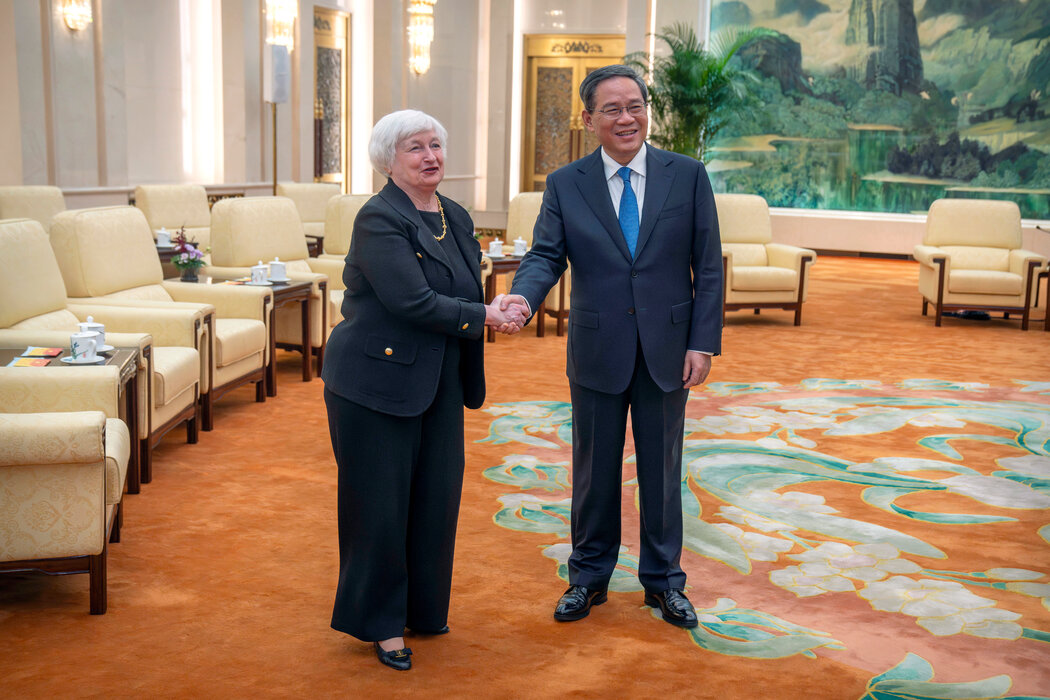
From April 4 to 9, U.S. Treasury Secretary Yellen visited China. This was her second visit to China since she took office, during which “China’s overcapacity” was once again in the spotlight. In an effort to turn around China’s sluggish economy in recent years, Beijing is selling cheap goods around the world, and Chinese companies are looking for overseas buyers for the vast amount of surplus goods, backed by cheap government-led loans. It’s a multi-trillion-dollar test that follows China’s impact on global manufacturing more than 20 years ago.
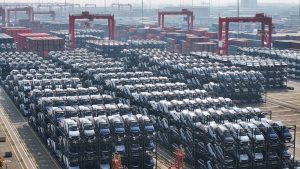
China in Transition
China’s economy is undergoing a painful transformation as Beijing tries to steer it out of the recession and real estate debt crisis that followed the Covid pandemic. Specifically, the Chinese government is promoting the so-called “new three” industries of solar panels, electric vehicles and lithium-ion batteries to aggressively produce and export these commodities in order to boost the economy. Overcapacity in photovoltaic products is the most prominent of China’s three new industries in foreign trade. By the end of 2023, China’s annual production capacity of finished solar components will be 861 gigawatts (GW), which is more than double the amount of components installed globally.
When these products are exported to Europe and the U.S., the survival of local companies will be in jeopardy, just as it was more than a decade ago, when Chinese steel swept the global market. Moreover, China’s economy is so large today that actions taken by Chinese entities could change international prices, potentially putting the survival of companies in the U.S. and other countries in question. Yellen emphasized that concerns about overcapacity are not motivated by anti-China sentiment or a desire to disengage, but rather by a desire to prevent global economic dislocation and to build a healthy economic relationship with China. At the same time, Yellen did not threaten to impose new tariffs on “overcapacity” industries. Only Beijing apparently sees things differently.
China’s Deputy Minister of Finance Liao Min responded to the U.S. skepticism by saying that “excess capacity” is a function of market mechanisms, that supply and demand are in relative balance, that imbalance is often the norm, that it can occur in any economy with a market economy, and that it is largely up to the market to make adjustments in accordance with the law of value. He also emphasized that the current production capacity is far from being able to meet the market demand, especially the huge potential demand for new energy products in many developing countries.
Undeniably, the production price of solar cells, electric vehicles and lithium-ion batteries produced in China is cheaper than those produced in Europe or the United States. The wages of skilled workers in China are still much lower than those in the West, and the society has not promoted the rights of workers, so the price of the same factory in the West is indeed higher than the price of similar products produced in China. Under the premise of globalization, it is a fact that Chinese products have an advantage. In the past, China produced low-end daily necessities, which were not important to the West, so the West was willing to absorb these straightforward goods. However, electric cars, solar panels and lithium batteries are items that Western societies have researched and developed but have not been able to produce in large quantities. I believe it is unlikely for Western countries to import from China at the expense of their own industries.
After all, trade is a matter of mutual consent. In the face of the impact on the long-term development of their own economies, it is inevitable that the West will revert to protectionism. In human history, this has often led to wars between nations. When Japan’s semiconductor and automobile industries surpassed the United States in the last century, the United States implemented a tariff policy that devastated Japan’s economy, and only then did it maintain its status as a major economic power today. In the face of China’s challenge today, it can be expected that the U.S. will still insist on various policies to suppress China’s development.
Anyone with a basic knowledge of economics will realize that if policies are focused on creating supply rather than demand, global spillovers will naturally occur. This phenomenon is related to the imbalance in the global trade structure caused by the epidemic and the pursuit of security in the supply chain, etc. The current situation is not optimistic, and the phenomenon is likely to continue for several years.
Unfair Economic Behavior
Beijing wants to replace the U.S. as the world’s technology center, and it has no problem competing with other countries in the relevant industries. But there are a variety of inequities in trade between the United States and China. For example, while the Chinese government can intervene heavily in markets, producers, and supply processes, locking U.S. companies out of the country, it demands that China have free access to the U.S. market, which has led to today’s situation. When Trump was in power, he set punitive tariffs on the trade deficit between China and the United States and required China to buy agricultural products from the United States, which were means of solving the trade gap between the two countries at the national level, but he still failed to face up to the market intervention and protection of domestic industries. However, the U.S. has been able to verify the Chinese business model, and it has been able to grasp the means by which the Chinese government has been able to influence the development of its enterprises. Today’s allegation that China is dumping money all over the world at the expense of other countries by spending US$300 billion on subsidies, restricting market access, and forcing technology transfers is a different story. In other words, it means to other countries that it is one company competing with one country. From the Great Leap Forward to China’s real estate boom, overcapacity is part of China’s broader governance style, which favors “overcapacity” and overshooting targets.
In the last 20 years of China’s reform and opening up, “excess capacity” has been and remains one of the weapons of China’s industrial strategy. From the “Made in China 2025” program, to the “One Belt, One Road” program, to the New Three Types of New Quality Productivity, some of these have been about finding international markets for China’s excess productivity, or even about attracting and stimulating the creation of a new industry from scratch by means of astronomical government subsidies from the outset, in order to capture a share of the international market as quickly as possible. Some of them are looking for international markets for China’s excess productivity, and even using government subsidies to stimulate the creation of a new industry from scratch. The imbalance between domestic supply and demand in China, coupled with the economic downturn in the real estate sector and other sectors, has also led to doubts about whether China is trying to get rid of its internal economic problems through exports.
China’s current flood of exports has already overwhelmed foreign competitors in some sectors; the difference this time is that the West has been prepared. The United States and the European Union have erected trade barriers, and emerging economies such as Brazil, India and Mexico have joined in the fight. For example, India has launched an anti-dumping investigation into Chinese-made bolts and screws, Argentina is investigating Chinese elevators, and the UK is investigating excavators and e-bikes.
In the face of this global backlash, China’s response has always been to denounce the rise of protectionism, suggesting that it has no intention of changing its strategy. It is not entirely wrong for China to say this, but China’s offense this time around is actually affecting the European countries as well, so the European countries will not sit idly by as China clashes with the US over trade. Although Yellen’s visit to China indicated that the US does not want to break ties with China, if Beijing stays on its current course, it is not impossible to rule out the possibility that the US and the rest of the world will move in a more protectionist direction.
Australia’s future opportunities
Australia’s economic structure is different from that of the West. Australia’s main economic exports are not industries, but raw materials, agricultural products and services. In fact, Australia’s industrial output is not large, so it is not an absolute competitor with China. On the contrary, Australia is a complementary economy to any industrialized country, especially one that does not have a large supply of raw materials.
However, China’s “overcapacity” is a wake-up call for the world economy, and given the volatility of the relationship between Australia and China in recent years, Australia has been “thinking of danger in times of peace”, and has been pushing for a diversification of its supply chain in order to minimize its dependence on the Chinese economy. Many countries have already begun to shift their supply chains away from China to other countries in East, Southeast or South Asia, and Australia is naturally adjusting its trade relations with other industrialized countries. Last month, for example, Australia-Vietnam relations were upgraded to a comprehensive strategic partnership, with new ministerial dialogues on priority areas, including energy and minerals, to diversify supply chains and reduce reliance on China. The two countries have also launched a new arrangement to allow 1,000 Vietnamese workers to fill labor shortages in Australia’s agricultural sector.
In addition, the so-called “overcapacity” in Chinese electric vehicles is benefiting a wide range of Australian customers. Australian Prime Minister Albanese has been actively promoting an emissions reduction program since taking office in 2022, creating a strong boost to EV demand. Sales of EVs have surged in Australia as foreign carmakers face no trade barriers and owners enjoy subsidies, tax breaks and relief from high fuel prices. That’s why BYD and other Chinese EV makers are making a big push into Australia, which is “friendlier” to them. According to data, BYD now has a 14 percent share of the Australian EV market, second only to Tesla, which has 53 percent. After all, Australia’s car market is heavily reliant on overseas markets, whether from China, Japan or India, it makes no difference to the people here.
In the short to medium term, accepting large quantities of low-cost Chinese goods will have temporary benefits for an Australian society dominated by agriculture and the service sector; but in the long term, to create a healthier economic and trade relationship, Australia will need to continue to expand its own supply chain, starting with a weakening of its economic dependence on China, especially in the face of the US and China’s struggle for economic hegemony, and a growing awareness of the need to expand its supply chain, especially in the face of the US and China’s struggle for economic hegemony. In a world where the US and China are competing for economic hegemony, and where there is a growing ideological war, each side is carefully testing the boundaries of the other while trying to expand its own space, Australia needs to think about its own way forward.
Once seen as the “weak link in the Western camp”, and with Beijing trying to wean Australia away from the US alliance, the West is slowly coming to its senses in the face of the unexpected new strain of influenza that is sweeping the world. Perhaps today’s world change is the perfect opportunity for Australia, which has long been caught between the US and China, to capitalize on its immigrant and multicultural strengths and take a different path to development.
Conclusion
Australia is in a different position from Western countries in terms of its small population and large amount of resources. Australia’s inability to efficiently produce cheap and good quality products in various industries has made it a country that relies on foreign imports for a long time. As China and the West struggle for dominance in industrial production, Australia is likely to be a beneficiary, obtaining cheaper products as everyone fights for the market.
However, after 20 to 30 years of over-reliance on China for tourism, education, export and investment, the Australian government has realized that it has to trade with different countries in a more comprehensive manner, and not to put all eggs in the same basket. Therefore, it is now time for Australia to establish a broader and more comprehensive cooperative relationship with the world economy. When the United States and European countries have to compete with China’s production capacity, Australia can have more choices.
Article/Editorial Department (Sameway Magazine)
Photo/Internet
What to explore ?

Where do Chinese Australians go from here?

Sydney Church Attacks: A Warning

The Internet Micro-Short Drama is Hard to Say

Identity of Chinese Australians

From the Mystery of “Sheikh of Dubai

Fraudulent ivermectin studies open up new battleground

Cantonese Mango Sago

NEMBC Arabic COVID 19 News – 14 June 2022

保护您自己和家人 – 咳嗽和打喷嚏时请捂住

FILIPINO: Kung nakakaranas ka ng mga sumusunod na sintomas, mangyaring subukan.
Trending
-

 COVID-19 Around the World3 years ago
COVID-19 Around the World3 years agoFraudulent ivermectin studies open up new battleground
-

 Cuisine Explorer4 years ago
Cuisine Explorer4 years agoCantonese Mango Sago
-

 Arabic2 years ago
Arabic2 years agoNEMBC Arabic COVID 19 News – 14 June 2022
-

 Cantonese - Traditional Chinese4 years ago
Cantonese - Traditional Chinese4 years ago保护您自己和家人 – 咳嗽和打喷嚏时请捂住
-

 Tagalog4 years ago
Tagalog4 years agoFILIPINO: Kung nakakaranas ka ng mga sumusunod na sintomas, mangyaring subukan.
-

 Uncategorized4 years ago
Uncategorized4 years ago如果您出現以下症狀,請接受檢測。
-
Uncategorized4 years ago
在最近的 COVID-19 應對行動中, 維多利亞州並非孤單
-

 Uncategorized4 years ago
Uncategorized4 years agoCOVID-19 檢驗快速 安全又簡單



